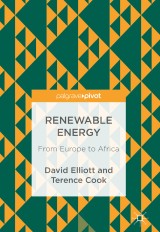Details

Renewable Energy
From Europe to Africa|
58,84 € |
|
| Verlag: | Palgrave Macmillan |
| Format: | |
| Veröffentl.: | 28.03.2018 |
| ISBN/EAN: | 9783319747873 |
| Sprache: | englisch |
Dieses eBook enthält ein Wasserzeichen.
Beschreibungen
<div>Significant progress has been made by industrial countries to reduce emissions from the use of fossil fuels, but as the economies of the less-developed regions of the world begin to expand, they too will face similar challenges. This book looks at energy transitions being made in developing countries, focusing on the adoption of renewable energy systems in Africa, for example under the UN Sustainable Energy for All programme, but also by the EU in the Former Soviet countries of Eastern and Central Europe. It draws on experience from involvement with programmes in the EU and Africa and will be of great interest to academics, policy makers and practitioners in the development aid and renewable energy policy fields.<br></div>
<b>1.Introduction: sustainable energy for all </b><i>(2k words- draft done)</i><p><b>1.1Mitigating climate change </b></p> <p>Setting out the global energy policy context and its drivers</p> <p><b> </b></p> <p><b>1.2 Global energy priorities </b> </p> <p>Issues for the developed and developing world reviewed </p> <p><b> </b></p> <p><b>1.3 Beyond mega projects </b></p> <p>The limits to ‘top down’ government and corporate intervention</p> <p><b> </b></p> <p><b>2. Spreading renewables: the EU and beyond </b></p> <p><i>(10k words- draft done)</i></p> <p><b> </b></p> <b>2.1 EU enlargement </b><p></p> <p>Energy policy challenges and issues in the accession countries </p> <p> </p> <p><b>2.2 The starting situation- and the Baltic area energy options </b></p> <p>with a Lithuania case study of decommissioning Soviet era nuclear plant <b> </b></p> <p><b> </b> </p><p><b>2.3 Economic and political drivers for change </b></p> <p>New Europe-new energy policy initiatives </p> <p><b> </b></p> <p><b>2.4 The Balkans and beyond </b></p> <p>Renewable options in the East, in and outside the new EU </p> <p><b> </b></p> <p><b>2.5. Subsequent progress in Central and Eastern Europe and beyond </b>Progress review in the EU pre-accession candidate countries</p> <p><b> </b></p> <p><b>2.6. The Russian potential </b></p> <p>The influence of Russia on the region and future prospects </p> <p> </p> <p><b>2.7 Beyond Europe and the West </b></p> <p>Going south- to the developing world</p> <p><b> </b></p> <p><b>3. Spreading renewables south- with new power infrastructures </b><i>(~2</i><i>0k words,</i><i> </i><i>half done</i><i> in draft</i><i>)</i></p> <p><b> </b></p> <p><b>3.1 Green energy for Africa </b></p> <p>Overview of the technological state of play and key issues</p> <p><b>3.2 Ghana </b></p> <p>Case study on setting up Ghana’s Renewable Energy Fund<b></b></p> <p><b>3.3 South Africa </b></p> Large scale projects grid extension v off-grid local projects <p></p> <p><b>3.4 Kenya </b></p> <p>Case study of energy- from- waste for Nairobi’s giant municipal dump </p> <p> </p> <p><b>3.5 Uganda</b></p> <p> </p> <p>Case study of monitoring Sustainable Energy for All targets for energy access</p> <p> </p> <p><b>3.6 Technical Aid </b></p> <p>The role of technical expertise and policy aids </p> <p><b> </b></p> <p><b>3.7 Institutional problems </b></p> <p>Internal and external policy conflicts<b> </b></p> <p><b> </b></p> <p><b>3.8 Effectiveness assessments </b></p> <p>Measuring success, but of what?</p> <p><b> </b></p> <p><b>3.9 Conclusions </b></p> <p>Are the aid programmes working?</p> <p><i> </i></p> <p><i>(An extra case study/analysis section may be added)</i>< </p><p><b> </b></p> <p><b>4. Supporting and promoting renewables: aid and beyond </b></p> <p><i>(~15k words, half done in draft)</i><i></i></p> <p> </p> <p><b>4.1 Supporting renewables </b></p> <p>The existing aid and technical support programmes</p> <p><b> </b></p> <p><b>4.2 The limits of aid and corporate involvement </b></p> <p>Pitfalls of commercial motivations<b> </b><b></b></p> <p><b> </b></p> <p><b>4.3 Financing renewable expansion </b></p> <p><b> </b>Feed-in Tariffs v Competitive Auctions</p> <p><b> </b></p> <p><b>4.4 Choosing the right technology </b></p> <p>Renewable options for the future<b> </b></p> <p><b> </b></p> <p><b>4.5 Corporate involvement and social progress </b></p> <p>The need for institutional and corporate change <b></b></p> <p><b> </b></p> <p><b>4.6 Conclusions: Sustainable Africa</b></p> <p>New policy options for the future<b> </b></p> <p><b> </b></p> <p><b>5. Conclusions: all change </b><b><i>(2k words)</i></b></p> <p>New frameworks for change</p>
<div><div>David Elliott is Emeritus Professor of Technology Policy at the Open University UK. Elliott’s expertise is in renewable energy policy, on which he has written extensively. He has worked on a range of projects, including an OU-led New Europe-New Energy programme (2003-2011), together with co-author Terence Cook.</div><div><br></div><div>Terence Cook is a Research Fellow at the Open University, UK. He has extensive field work experience of projects and practices in developing countries, most recently working for the EU’s Technical Assistance Facility in Eastern and Southern Africa, in support of the UN Sustainable Energy for All programme.</div></div><div><br></div><div><br></div>
<div>Significant progress has been made by industrial countries to reduce emissions from the use of fossil fuels, but as the economies of the less-developed regions of the world begin to expand, they too will face similar challenges. This book looks at energy transitions being made in developing countries, focusing on the adoption of renewable energy systems in Africa, for example under the UN Sustainable Energy for All programme, but also by the EU in the Former Soviet countries of Eastern and Central Europe. It draws on experience from involvement with programmes in the EU and Africa and will be of great interest to academics, policy makers and practitioners in the development aid and renewable energy policy fields.<br></div><div><div><p><br></p></div></div>
<p>Provides an accessible account of the problems encountered when implementing sustainable energy in countries where there is little or no experience with renewables</p><p>Discusses potential conflicts between countries, agencies and what resources are available for a sustainable future</p><p>Explores the potential for environmentally and socially sustainable energy systems to be developed</p>

















